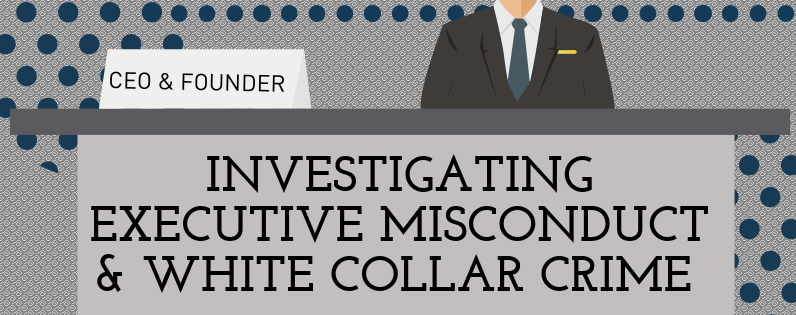
Investigating Executives & White Collar Crime
Don’t let executive misconduct ruin your corporation…
When it comes to running a business, the executives who are the visionaries and decision-makers that shape a company should always remain above reproach. White collar crimes have the potential to pull a business up from the root with devastating consequences. Unfortunately, Americans know from media coverage and social media that there’s few things we are more attracted to than stories about high-ranking officials and the misconduct that negatively impacts their businesses—both in profits and in public relations.
Many will be familiar with the recent news of Amazon CEO Jeff Bezos’ high-profile divorce following allegations of infidelity, in which his ex-wife became the richest individual in history by virtue of divorce proceedings. The fallout from executive misconduct can leave a trail of legal fees, government sanctions, violations, and public relations-related crises that can devastate a company from the top down.
Thought to be coined in 1932, the phrase “white collar crime” now refers to a spectrum of frauds and other crimes committed by high-ranking executives and officials. The most common characteristics of white collar crime contain aspects of deceit, concealment, or violation of company policies and/or state and federal law. The motive is financial, with executives skimming off the top of a company’s profits for their own use. These crimes are sometimes thought of as “victimless crimes,” with no regard to how the fallout from a fraud or scheme can impact the company, and therefore the families of its employees. The types of fraud include, but are not limited to:
- Bank fraud
- Blackmail
- Bribery
- Cellular phone fraud
- Computer fraud
- Counterfeiting
- Credit card fraud
- Currency scheme
- Environmental schemes
- Extortion
- Forgery
- Health Care Fraud
- Insider trading
- Insurance fraud
- Investment schemes
- Kickbacks
- Larceny/theft
- Money laundering
- Racketeering
- Securities fraud
- Tax evasion
- Telemarketing fraud
- Welfare fraud
- Weights and measures
Corporate fraud and white collar crime of this nature remain one of the Federal Bureau of Investigation’s top priorities when it comes to identifying and indicating perpetrators. While involvement by government agencies may seem like the end of the line, there are ways companies can get out in front of executive misconduct by hiring a private investigator to investigate these matters.
Private investigators have a unique reputation as slick operators who fly under the radar, but they are invaluable professionals to companies in the throes of a corporate crisis because they are independent and objective. Objectivity is the priority when dealing with executive misconduct and white collar crime, as any allegations or evidence presented against the executive must be presented by an individual with no stake in the outcome of the investigation. Private investigators are independently contacted by a business or corporation to investigate the alleged executive misconduct, and can gather evidence and collect witness statements without the air of bias. Because private investigators are independent contractors, there is no fear of reprisal on behalf of coworkers and other employees at the company. This leaves no lead discounted or ignored. They can investigate employees at all levels, and determine how (if at all) the executive is receiving assistance in their fraud from subordinates. One of the most attractive qualities in a private investigator is that their objectivity makes them crucial witnesses in any legal proceedings that may result from the investigation.
Businesses and corporations should never be beholden to CEOs, presidents, and other high-ranking executives who behave badly. Executive misconduct and corruption are like aggressive weeds that must be pulled from the root in order for businesses to flourish. When it comes to rooting out bad leadership, consider hiring a private investigator to navigate a tricky investigative path that can end in quality operations and peace of mind for businesses large and small.
If you have a corporate crisis like executive misconduct, we can help. Call Lauth Investigations International, a family-owned-and-operated investigative firm with over 30 years of providing successful solutions to clients in Indianapolis and throughout the nation. Call 317-951-1100 for a free consultation, or to learn more about our services, please visit our website.

